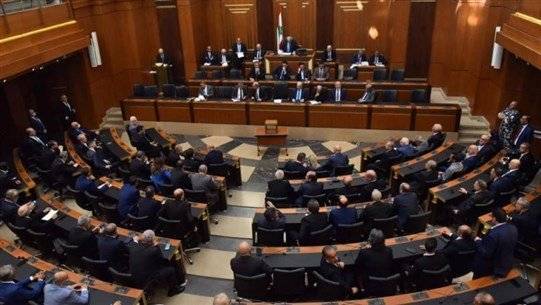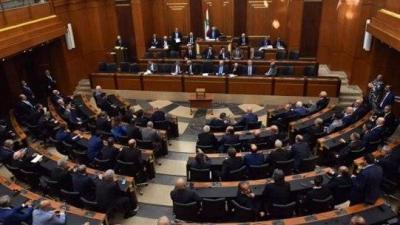By the testimony of parliamentary insiders, yesterday's legislative session was a "laugh at chins." A seasoned deputy said, "We entered the session knowing the outcome in advance. Michel Moawad would receive 38 votes if not for some absences. Strida Geagea and Ni'ma Afram, who also sees himself as a natural presidential candidate despite no one mentioning his name, should have held such a session, so it was held." He continues, ruling out the possibility of this council, in its current composition, reaching an agreement on a president. Thus, the result was known.
It was a parliamentary rehearsal from which the duo and their allies emerged comfortable with their situation, while the other forces would be obliged to arrange their matters. Eluding the constitutional deadline to avoid making the holding of sessions for electing a president automatic, Speaker Nabih Berri has set the first session dedicated to electing the new president, implicitly responding to all calls from Bkerke to respect constitutional deadlines and to the words of its leader, as well as to the positions of skeptics.
He sent the ball back to the other forces, turning the parliament into a machine to reveal presidential intentions, making it a session that could be read from multiple angles. Evidence of this parliamentary scene shows that the era of needing a simple majority to elect a president has ended, and it is no longer possible to elect a president in the way that brought Suleiman Frangieh the grandfather to Baabda, i.e., by getting one more vote than his opponent. This happened before the Taif Agreement. Afterwards, consensus became the hallmark of a successful electoral session, whether regionally, internationally, or locally.
The important thing is that the number of electoral sessions, even if they are numerous, will not result in electing a new president unless they are crowned by a prior agreement on the name, and this council is unlikely to reach a consensus on a president. As a result of yesterday's session, Deputy Michel Moawad entered the ranks of candidates, even though his opponents criticize him for being the candidate closest to the Americans and a partner with the banking system. Yet he introduced something new concerning the type of candidates, in facing the internationally renowned businessman Selim Eddé.
Eddé's ascent to the presidency depends on his acceptance as a character, but he does not possess ties with all factions to endorse his candidacy. The votes Moawad received, even with Eddé's votes added later, do not negate that his name was at risk of being burned as long as his candidacy did not garner prior agreement even among the 14 March Forces and the Change Movement.
The competition in the parliament was formal between Selim Eddé and Michel Moawad, and substantive between the blank paper and its counterpart. As a result, the 14 March Forces and the Change Movement went away confirming their fragmentation and the impossibility of agreeing on a candidate's name. Even if that agreement were to happen, it would be impossible for them to secure the quorum of the 86 votes necessary to hold a session.
Neither the 8 March Forces nor the Free Patriotic Movement are in a better position; collectively with their allies, they do not form a majority of 86 votes, but this did not prevent the Shiite duo and the Free Patriotic Movement from leaving the session in a better position than the other forces. They did not treat Moawad’s candidacy as a serious nomination because electing a president is a rejected challenge, nor did they treat the votes by the deputies of the Democratic Gathering in favor of him as serious, given that the position of Progressive Socialist Party leader Walid Jumblatt is unstable and may not hold against any agreement on a different name like Suleiman Frangieh.
Even if he does not support him, at least he can ensure the quorum for holding the session since electing the president requires securing 86 deputies’ attendance, not just their votes. From the duo's perspective, the session demonstrated that their team can rally votes while the other team showed a real divergence in their deputies' views. Although they might agree, they cannot achieve a majority that would secure the session's quorum. The duo and their allies, along with the Free Patriotic Movement and Frangieh's deputies, plus a number of Sunni deputies, can mobilize to secure the quorum by aligning with Jumblatt. However, these forces are facing a real challenge: the impossibility of gaining Bassil's approval for electing Frangieh, and if they feel his chances to be weak, they face a genuine crisis over a competitive alternative to the 14 March Forces and the sovereignists.
Regarding the behavior of the Sunni deputies in the first electoral session and following the meeting at Dar Al-Fatwa and the Saudi ambassador's invitation, it was noteworthy how they distinguished themselves by voting for Lebanon, with the number of deputies voting this way reaching ten, indicating that they organized themselves outside the alignments, giving an initial signal of unity and a second signal of differentiation even from the Lebanese Forces.
Before adjourning the session, Berri announced that he would not call for a second session before agreeing on who the president should be. Achieving consensus in the current situation between the two teams does not seem possible in the near future since the current composition of the parliament will not lead to securing the necessary votes for a president from either March 8 or 14 forces or the sovereignists, meaning Berri's condition will not be fulfilled unless there is a regional or international shift that reflects on the constitutional obligation. At the start of the session, Deputy Speaker Elias Bou Saab responded to a question by saying that yesterday's parliamentary session would end in announcing the end of a former presidential candidate, correcting his colleague by saying, "No, rather it’s the end of a rejected presidential candidate."




